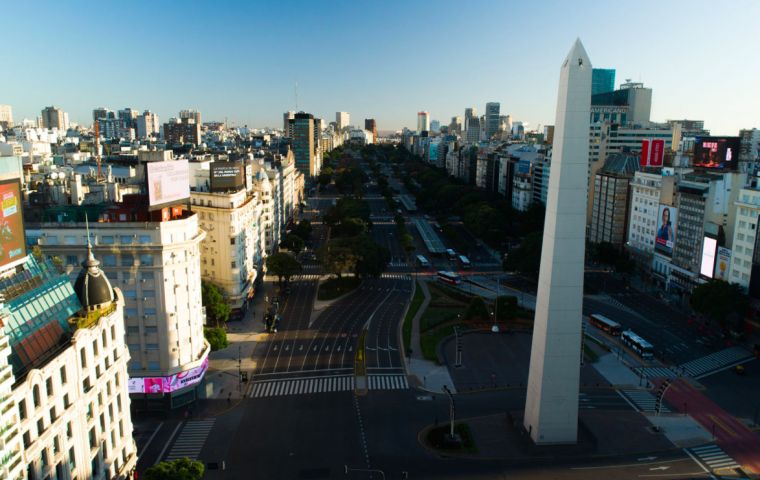MercoPress. South Atlantic News Agency
ITUC praises Argentina for putting people first in fighting Covid 19
 These 12 countries set a standard on what governments could provide for workers that need to be emulated by many more governments around the world
These 12 countries set a standard on what governments could provide for workers that need to be emulated by many more governments around the world A new analysis from the International Trade Union Confederation, ITUC, of government responses from 69 countries to the COVID-19 pandemic has identified 12 governments that are putting people first as they tackle the economic fallout from lockdown measures to stem the spread of the virus.
Argentina, Austria, Canada, Denmark, France, Germany, Ireland, New Zealand, Norway, Singapore, Sweden and the UK are the first 12 governments that have put in place policies to protect lives, jobs and incomes.
“Direct government support for the real economy is the only way workers will be able to stay in their homes and feed their families while the economy is shut down. These 12 countries set a standard on what governments could provide for workers that need to be emulated by many more governments around the world. There are still significant gaps in some of the countries and the unions are pressing for these gaps to be filled,” said Sharan Burrow, ITUC General Secretary.
The ITUC has identified five demands which will have the most direct impact on working people -paid sick leave, wage support and income support for freelancers, self-employed workers, gig economy workers, as well as loan relief for rent or mortgage payments and free health care.
“These measures are a start – but implementation with fast payments is key. A pandemic with no known end date will mean more support is needed for working people. The health, social and economic consequences of COVID-19 will require new levels of care, of social protection and of economic stimulus in all countries. It will take a new social contract,” said Sharan Burrow.
Two countries in the Americas region, Argentina and Canada, have put in place income support for self-employed workers. Argentina is offering the self-employed 10,000 pesos (US$157) for April. On Friday evening Uruguay announced similar measures and food baskets in April and May for low income families and an increase in funds and extension of unemployment pay.
In Europe, eight governments Austria, Denmark, France, Germany, Ireland, Norway, Sweden and the UK made the list. Even though there is more to do in some of these countries the European social model and dialogue with social partners has led to fast responses in many countries.
In the Asia-Pacific region, Singapore and New Zealand have provided extensive income and wage support for all categories of workers.
While these governments set a pathway for others to follow, unions remain gravely concerned for the impact of the measures needed to constrain the virus in India where 94% of workers are in the informal economy. Unions have been calling for serious measures and some support for these workers has been provided but much more needs to be done. All workers, but informal workers in particular are in need of income support, distribution of rations and loan relief. The government has begun to respond to union concerns however the response has still been insufficient.
“The positive responses to the pandemic demonstrated by these 12 countries have been the result either of strong tripartite or social dialogue structures or traditions, or concerted and successful campaigning and lobbying by trade unions. The involvement of unions representing working people is key to ensuring that governments act to put people first in the response to COVID-19. The ITUC is urging other governments to follow these examples and involve unions in designing the economic responses urgently needed as the world responds to the pandemic,” said Sharan Burrow.




Top Comments
Disclaimer & comment rules-

Read all commentsWhen push comes to shove, states become more necessary than ever to co-ordinate response measures.
Mar 28th, 2020 - 05:36 pm -1Key measures, according to the ITUC, are paid sick leave, wage support and income support for workers, as well as loan relief for rent or mortgage payments and free health care.
Argentina narrowly escaped a very different fate thanks to the electors' choice last October, when they kicked out “business-friendly” Macri out of office after a single, disastrous four-year term.
Newly elected president Alberto Fernandez, who inherited a wrecked economy, has been widely praised for imposing strict measures to contain the spread of the coronavirus and for caring for the citizens' lives as his first priority. In comparison, Brazil's response has so far been taken mostly by states, with president Jair Bolsonaro remaining opposed to send workers home -- out of worries for the economy.
Commenting for this story is now closed.
If you have a Facebook account, become a fan and comment on our Facebook Page!